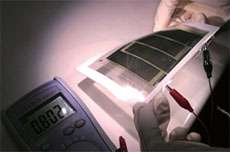An OPV passes a conductivity test in a bent position. Image: Mitsubishi Chemical Corp.
(PhysOrg.com) -- Mitsubishi Chemical Corp has created an organic photovoltaic (PV) cell that can boast a cell conversion efficiency of 8.5% and while that may not sound like a lot to those of us who do not study photovoltaic technology it, as a matter of fact, makes the organic photovoltaic cell created by the Japanese company the highest in efficiency currently in existence.
This measurement of 8.5% cell conversion efficiency is currently based on the in house testing that was done by Mitsubishi Chemical Corp. It has yet to be verified by any external lab testing at this point. Testing by an external lab is in the plans for this product in the future but no date or lab name has been given for this testing at this point. The company expects, based on previous testing experiences, that the results will not show a high level of variance when the out-of-house testing results are in.
The cell, which clocks in at measurements of about 5mm x 5mm, is an improved version of a previous organic photovoltaic cell that was announced by Mitsubishi Chemical Corp in March of 2010. That previous version of the cell had a cell conversion efficiency of 7.44%, making the level of improvement roughly one point per year for these cells.
Possible applications for these organic photovoltaic cells would include the creation of an organic thin-film PV battery module that could be used in office windows. The company expects to be testing this style of module by the end of 2012. They also mentioned some potential uses in the automobile industry, but no specifics were given as to this application.
More information: www.mitsubishichem-hd.co.jp/en … ject/solar_cell.html
© 2010 PhysOrg.com






















